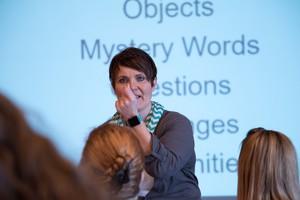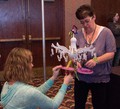Keynote speaker: 'Let children be children'

CHADRON – The importance of play in a child’s life was the central message by keynote speaker Denita Dinger during at Chadron State College's 27th Annual Excellence in Early Childhood Education conference in the Student Center Ballroom Saturday.
Dinger, who authors the Play Counts blog, readily admitted to the audience she was a convert to the power of play.
“I used to see play as something to get their wiggles out of the way so they could sit still and quietly listen to me teach them,” she said. “Then I realized that empathy, exchanging ideas and a host of self-regulating attributes such as perseverance, problem-solving, delayed gratification, dealing with struggles and frustration, and empowerment come through play. Let a child who is two, be two with every ounce of their being.”
Students who are “quick to quit” in Dinger’s words, eventually realize they are not going to reap rewards if they don’t keep trying. As they observe other children fail and repeat an activity, they can be encouraged and others might volunteer to help them, leading to a collaborative venture.
To reinforce her belief in the importance of play, Dinger displayed an image of a Finnish proverb numerous times throughout the program: “Those things you learn without joy you will forget easily.” She also shared statistics about the academic success of Finland’s students to support the philosophical statement.
“I want you to leave today with the word ‘joy’ ingrained in your brain,” she said.
She outlined the “super power” roles for adults in an “uncurriculum,” a curriculum that embraces child-led play. Dinger’s categories include: Controller of Stuff, Controller of the Environment, Plopper, a person who places or hides objects for children to discover, Stellar Reactor, a person who reflects the wonder and delight a child shares about a discovery, Quiet Observer, and Dissector who documents and deconstructs a child’s learning, often with photos.
Dinger urged child care providers in attendance to take a stand against governmental and regulating bodies assessing children for abilities that are not age appropriate, such as computer skills in kindergarten. Parents can also be a source of unrealistic expectations based on hyper vigilant preparation for and success in school, Dinger said.
Dinger said too much time on mobile devices, tablets or iPads during preschool can harm a child’s visual tracking skills and other normal vision development. She encouraged low tech activities such as watching a ball or other objects as the best way for an infant’s eyes to develop.
“One child just sat and swiped her hand across in front of her as a result of too much screen time. I’ve even found myself touching a print photo with my thumb and forefinger and then spreading them apart to enlarge the photo. This is crazy. Some strollers are actually coming with a holder for a tablet in front of the toddler. That is not right,” she said.
The rush, by parents, to have a child begin handwriting, is another concern among care providers.
“One mother was so upset that her 3-year-old daughter could not sign her name. I’m fluent in sarcasm, so I paused a moment, thought, and then asked the mother with mock seriousness, ‘How is she ever going to sign all those forms every week?’ She paused, took a breath and realized her unfounded worries,” she said.
Dr. Kim Madsen, professor in CSC’s Applied Science department, said she was pleased and energized to hear Dinger defend the importance of age appropriate play.
“I so agreed with Denita. I am very concerned about education forcing children to start school with skills that are not developmentally appropriate. Learning should be fun and joyful, challenging children to take risks to solve their own problems, explore the world, and discover answers on their own,” Madsen said.
The child care providers in attendance were able to play and get their hands messy during the final hour of the daylong course. Dinger guided participants through about 10 stations featuring homemade play materials from her recipes including foam, sculpting dough, colored vinegar and baking soda combinations, a magnetic pendulum and a high-powered blower and tubing.
Pre-session workshops Friday about language and literacy, economics activities, Shaken Baby Syndrome, preventing SIDS and child abuse Friday attracted about 100 participants in addition to more than 130 who attended Saturday’s session, according to Madsen.
Category: Campus News, Education




